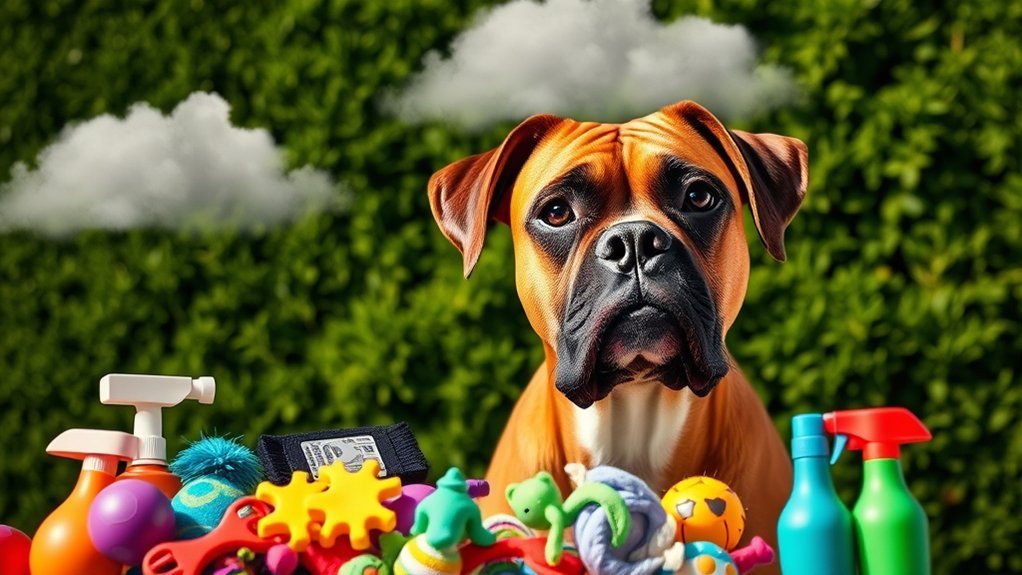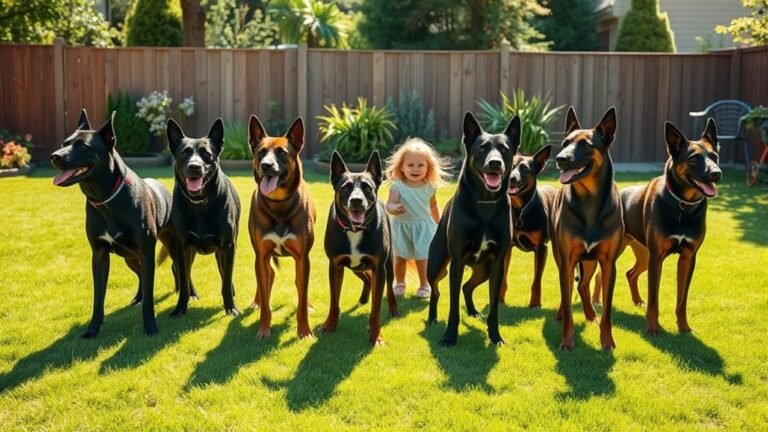Ultimate Guide to the Boxer: Facts, History, and Care
If you want to own a Boxer or already have one, it's important to know about their background and special qualities. Boxers are famous for their good looks and friendly nature. They love to play and are very loyal to their families. But just like any dog, they have specific health needs and care tips that you should keep in mind. Understanding these things can help you build a strong bond with your Boxer and ensure they are happy and healthy. So, what should you know about taking care of them?
Key Takeaways
Boxers started in Germany in the late 1800s. They changed from hunting dogs to loyal family dogs.
These dogs are strong, with square jaws and friendly eyes. They have a fun and lively personality. Boxers love attention and need daily exercise. They like to be close to their owners and form strong bonds.
Boxers can have health problems like hip dysplasia and heart issues. It's important to take them to the vet regularly to keep them healthy.
Feeding your Boxer a balanced diet is also key. Choose high-quality food that fits their age. This helps keep your Boxer healthy and can avoid allergies.
The Origins of the Boxer Breed
The Boxer dog started in Germany in the late 1800s. It comes from two breeds: the Bullenbeisser and the English Bulldog. Learning about where the Boxer came from helps us understand what makes them special.
The first Boxers had important traits that turned them into loyal and energetic friends. Over time, their role changed. They went from helping people with hunting to being trusted family protectors.
This change shows how the Boxer has always been close to humans. By looking at the history of the Boxer, we can see a strong connection to our lives.
This connection helps us appreciate the breed and strengthens our bond with our Boxers today. Whether they're playing in the backyard or resting by your side, Boxers are truly wonderful companions.
Distinctive Traits and Characteristics
Boxers are special dogs with features that make them stand out. They've strong, muscular bodies and square jaws that give them a unique look. Their eyes are full of expression, showing their friendly nature. Their short, shiny coats are easy to take care of, and their bristles help keep them cool.
Boxers are also known for being playful and energetic. They love to play and run, making them great pets for active people. They want to learn and please their owners, which makes training them fun and easy.
Because of their friendly personalities and fun-loving nature, Boxers often become beloved members of the family, creating a strong bond with everyone.
The Boxer Temperament
Boxers are lively and loving dogs. They've a fun and happy attitude that makes them great friends. Their playful energy can lift your spirits and invite you to join in on their games.
As a Boxer owner, you'll feel their loyalty. They form strong bonds with you and thrive on love and attention. Boxers can even tell how you feel. When you're having a tough day, they're there to comfort you. Their silly antics can always make you smile.
This breed loves to be active. They need daily exercise, mental play, and lots of affection to be their best selves.
When you welcome a Boxer into your home, you get a joyful companion. They'll fill your life with happiness and ensure you never feel lonely.
Understanding Boxer Health Issues
Taking care of your Boxer's health is crucial for helping them live a long and happy life.
Boxers can have some health problems because of their genes, so it's good to know what to watch out for. Common issues include hip dysplasia, heart problems, and some cancers. These can affect how your dog feels and lives.
Regular visits to the vet are important. These check-ups can help find health issues early so they can be treated properly.
It's also helpful to know your Boxer's family health history. This can give you a heads-up about possible health concerns.
Keeping an eye on your Boxer's weight and making sure they get enough exercise is another big part of keeping them healthy.
Nutrition and Diet Recommendations
A balanced diet is very important for your Boxer's health and happiness. As your Boxer gets older, they need different types of food that fit their age. Puppy food has a lot of protein for growing, but adult dog food helps keep them healthy and at a good weight.
Watch for food allergies too. Some Boxers can have trouble with grains or certain meats, which can cause tummy aches or skin problems. It's a good idea to choose high-quality dog food with fewer additives to help prevent allergies.
Regular visits to your vet can help you choose the right food for your Boxer. This way, you keep them happy and healthy.
Grooming and Maintenance Tips
Grooming your Boxer is important for their health and looks. Set up a regular grooming schedule.
Brush your dog once a week to get rid of loose hair and spread their natural oils. This helps their coat shine.
Use good dog shampoo for bath time. This will keep their skin healthy.
Check their ears often. Look for dirt or wax, and clean them gently.
Don't forget about their nails! Trim them regularly to avoid discomfort.
By taking care of your Boxer's grooming needs, you help them feel good and look great.
It also helps you bond and feel closer as a family.
Training Your Boxer: Techniques and Strategies
A well-groomed Boxer is easier to train. Start with clicker training. This method helps your dog learn good behavior. When your Boxer follows a command, click the device and give a treat. This way, your dog connects the action with a reward. It also helps you communicate better with your pet.
Next, teach your Boxer to walk nicely on a leash. This makes walks more enjoyable and keeps both of you safe. Use short and clear commands. When your Boxer listens, give praise or a treat. This creates a fun routine and builds your bond.
Training can be a fun adventure for both you and your Boxer!
Socialization and Play Needs
Socialization is very important for your Boxer. It helps them grow into a friendly and confident dog. Playtime activities are key for their health. Games like fetch and tug-of-war keep them happy and active. These activities also help their brains stay sharp.
Your Boxer needs to spend time with other dogs and people. This helps them feel comfortable in different places and situations. You can set up playdates or take them to dog parks. These outings give your Boxer new adventures.
While your Boxer plays and meets new friends, use positive reinforcement. This means giving them praise or treats when they behave well. It helps them learn to be gentle and less anxious in new situations.
When you focus on socialization and play, your Boxer will thrive. They'll become a loving and strong member of your family.
The Boxer in Family Life
Bringing a Boxer into your home is an exciting adventure! These dogs love family life and need plenty of love and attention.
Boxers fit well with different kinds of families. They create strong bonds with everyone, showing a special ability to sense how you feel and respond with warmth and loyalty.
Boxers are playful and energetic. They love to join in on family activities, making children feel happy and safe.
They're strong protector dogs but are also gentle, which makes them great companions. To keep the family happy, regular training and socializing is important. This helps your Boxer understand how to behave in different situations.
With your love and dedication, your Boxer will become a beloved member of the family. They'll bring joy and companionship into your life!
Lifespan and Aging Care Considerations
Taking care of your Boxer as they grow older is important for their happiness and health. Boxers usually live between 10 and 12 years. As they age, you may see changes like less energy, weight gain or loss, and difficulty moving.
To help your senior dog, make sure to take them to the vet regularly to check their health. Feed them a balanced diet made for older dogs, and think about adding joint support if they need it.
Gentle exercises can keep them active without tiring them out.
Playing and spending time with your Boxer is very important. Keep engaging with them in fun activities, but pay attention to how they feel and don't push them too hard.
Adjusting your care as they age will make your bond stronger and improve their quality of life. This way, your Boxer will stay a loved part of your family.
Frequently Asked Questions
What Is the Average Cost of Adopting a Boxer?
Adopting a boxer dog usually costs between $100 and $300. This fee helps cover the care of the dogs and supports rescue groups. When you adopt, you get a loving pet and help these organizations continue their important work. It's a great way to bring joy into your life while also making a difference!
Are Boxers Good With Other Pets?
Boxers can get along well with other pets. They are usually friendly and playful, which helps them bond with other animals. To make sure they get along, it's important to train them early. Socializing your Boxer with other pets from a young age helps them learn how to be friends with them. With some care and the right approach, Boxers can be great companions for your other furry friends!
How Do Boxers React to Strangers?
Boxers often feel curious but careful around strangers. They may guard their families, so they can be a bit wary. If you train them to be friendly and social, they can learn to be more comfortable and welcoming with new people. With time and patience, your Boxer can become a great buddy for everyone!
What Is the Best Age to Adopt a Boxer Puppy?
The best age to adopt a Boxer puppy is about eight weeks old. At this age, you can start training your new puppy. You'll also want to think about their health to help them grow into a great friend. Bringing a Boxer puppy home at this age can lead to a happy and well-adjusted pet. Make sure to enjoy your time with them as they learn and play!
Can Boxers Live in Apartments?
Yes, boxers can live in apartments. They need a lot of exercise and fun activities every day. Make sure you have enough space for them to play and relax. Boxers are full of energy and love to be active, so keep that in mind when choosing an apartment. With the right care, they can be happy in a smaller space.





